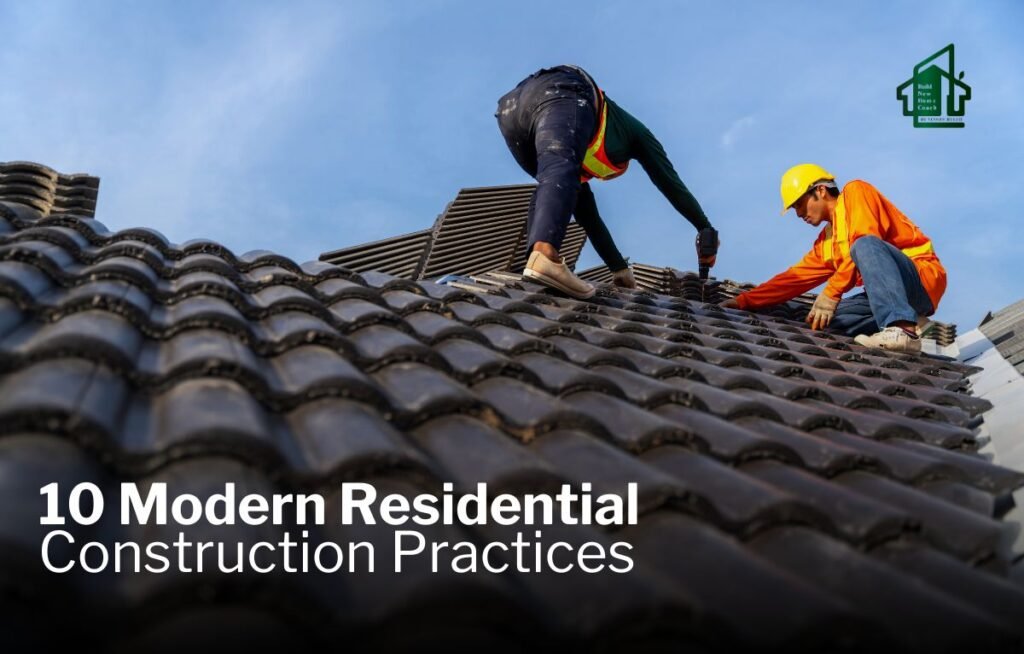
Want To Start Building Your Dream Home?
10 Essential Lean Construction Practices for Modern Builders

The way we build homes is evolving, and it’s about more than just aesthetics—it’s about smarter, greener, and more efficient construction.
Modern residential practices are transforming the industry, making homes better for both the environment and the people living in them.
Here are 10 construction innovations shaping the future of homebuilding.
1. Sustainable Building Materials
One of the biggest trends in modern residential construction practices is the use of sustainable building materials.
From recycled steel to reclaimed wood, builders are focusing on materials that reduce environmental impact.
These materials are durable, energy-efficient, and cost-effective, which makes them appealing to both eco-conscious homeowners and those looking for long-term savings.
2. Energy-Efficient Design
Energy-efficient homes have moved from being a luxury to a necessity.
Builders are incorporating features like high-quality insulation, energy-efficient windows, and advanced HVAC systems into new homes.
These energy-saving designs not only lower utility bills but also reduce the home’s carbon footprint.
Modern residential construction practices make it easier than ever to design homes that are energy-smart from the start.

3. Smart Home Technology Integration
Today’s homes are more connected than ever before, and integrating smart technology has become standard practice.
From security systems to lighting and climate control, smart home devices make living spaces more convenient and energy-efficient.
Builders are now installing these technologies during construction, ensuring seamless integration that enhances both comfort and security.
4. Prefabrication and Modular Construction
Prefabrication and modular construction are gaining popularity due to their cost and time efficiency.
These methods allow builders to construct sections of a home in a controlled environment before assembling them on-site.
This approach reduces waste, speeds up the construction process, and lowers labor costs, all without sacrificing quality.
Modern residential construction practices that incorporate prefabrication are helping builders deliver homes faster and more affordably.
5. Open Floor Plans
The demand for open floor plans continues to grow as homeowners seek flexible, spacious living areas.
Modern residential construction practices now prioritize large, multi-functional spaces that connect the kitchen, dining, and living areas.
This design trend not only improves the flow of the home but also makes it easier for families to spend time together.
6. Net-Zero Homes
Net-zero homes, which produce as much energy as they consume, are becoming more common as part of modern residential construction practices.
These homes typically feature solar panels, advanced insulation, and energy-efficient appliances.
While the upfront cost can be higher, homeowners benefit from long-term energy savings and a reduced environmental impact.
7. Advanced Insulation Techniques
Improved insulation is a cornerstone of energy efficiency in modern residential construction practices.
Builders now use spray foam, fiberglass, and rigid foam to create highly insulated homes that maintain indoor temperatures better.
This not only reduces the need for heating and cooling but also improves indoor comfort year-round.
8. Low-VOC and Non-Toxic Materials
Health-conscious homeowners are driving the demand for low-VOC (volatile organic compounds) and non-toxic materials in construction.
Modern residential construction practices emphasize using paints, sealants, and building materials that are free from harmful chemicals, making homes healthier for occupants.
This shift is part of a broader trend towards wellness in home design.
9. Resilient Construction for Extreme Weather
With the increasing frequency of extreme weather events, resilient construction has become essential.
Modern residential construction practices focus on building homes that can withstand hurricanes, floods, and other natural disasters.
Builders are using impact-resistant windows, reinforced foundations, and storm-resistant materials to ensure homes stay standing in the toughest conditions.
10. Water Conservation Systems
Water conservation is another priority in modern homebuilding.
Builders are incorporating rainwater harvesting systems, low-flow fixtures, and greywater recycling into new homes.
These systems help reduce water consumption and can significantly lower utility bills for homeowners.
As water shortages become a bigger concern, these water-saving features are becoming more common.
Building Homes for Today and Tomorrow
Modern residential construction practices are not just about building homes that look good—they’re about creating spaces that are sustainable, efficient, and ready for the future.
These practices are reshaping the way homes are designed and built, leading to better living experiences for homeowners.
At Build New Home Coach, I help guide you through the process of building a home that reflects these modern standards.
Our focus is on making sure that your new home is built to last, using the latest practices that benefit both the environment and your wallet.
If you’re interested in energy efficiency, sustainable materials, or smart home technology, I’m here to assist you every step of the way.
I believe that building a new home should be exciting, stress-free, and aligned with the best construction practices available today.


